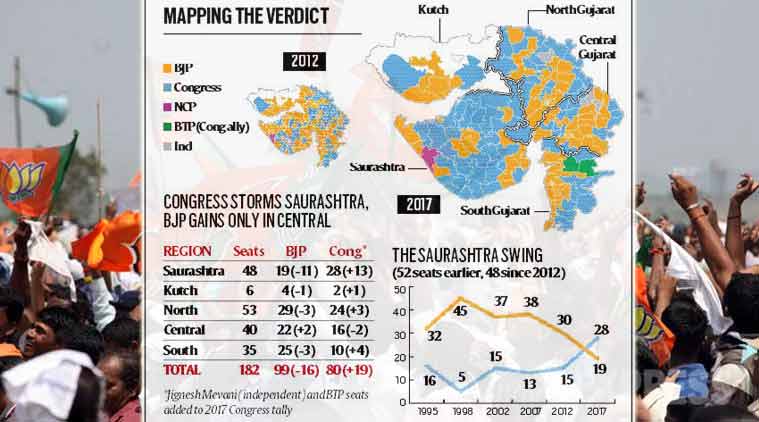Leena Misra is a Senior Journalist working with The Indian Express. ... Read More
Latest Comment
Post Comment
Read Comments
 Amit Shah at BJP headquarters in New Delhi following the party’s victories in Gujarat and Himachal Pradesh. (Express photo: Tashi Tobgyal)
Amit Shah at BJP headquarters in New Delhi following the party’s victories in Gujarat and Himachal Pradesh. (Express photo: Tashi Tobgyal)
Missing the 100-seat mark, the BJP finished with 99 seats, and the Congress with 80 (including ally Bharatiya Tribal Party’s two and Jignesh Mevani’s seat), after nearly 12 hours of counting on Monday.
Much of the Congress numbers was powered by the turnaround in Saurashtra, where the party won 28 seats (up from 15 it held earlier), besides central and north Gujarat.
In Mehsana, Congress won two of six seats — Unjha and Becharaji. Prime Minister Narendra Modi’s hometown, Vadnagar, is in Unjha, where Congress’s Asha Patel defeated five-time BJP MLA Narayan Patel by over 19,000 votes.
Also Read: Five reasons why BJP won in Gujarat; one is MODI, here are the other four
Notwithstanding the BJP’s bravado and slogans at the party’s Gandhinagar headquarters on Monday evening, the election was a referendum on the new-age leaders — Hardik Patel, Jignesh Mevani, Alpesh Thakor and even new Congress president Rahul Gandhi — and their new narrative that redefined benchmarks of vikas (development). That the people voted out four ministers —- Shankar Chaudhary (health and family welfare), Atmaram Parmar (social justice), Chiman Sapariya (agriculture and power) and Jasha Barad (water supply, civil aviation, salt industry) — emphasised this.
Also defeated were the top Gujarat leaders of Congress: party’s national spokesperson Shaktisinh Gohil, Arjun Modhwadia, Siddharth Patel, and Tushar Chaudhary.
The Congress, however, could not make any inroads in Surat despite the anti-GST protests, the much-discussed impact of demonetisation, or Hardik and Rahul’s intense campaigning there.
Also Read: Tally in Gujarat House reduced to 99 but BJP beats back Opposition, resentment
Gujarat Congress president Bharatsinh Solanki said the verdict is an indication that people have rejected the BJP’s idea of “Congress-mukt Bharat” (Congress-free India). “This is a vote for democracy. It is a vote by the people to the Congress to strengthen the voice that questions,” he said. Palanpur, where Modi spoke of the “Pakistan hand” in one of his rallies, went to the Congress kitty. The party also won four more seats in Banaskantha district besides Vadgam, where it supported Mevani.

In Kutch, where Modi launched his campaign, Congress gained one more seat, taking its tally to two of six seats in the district.
In Saurashtra, which has 48 seats, the BJP count shrunk from 30 it had won in 2012 to 19 this time, notwithstanding the Saurashtra-Narmada Avataran Irrigation (SAUNI) yojana to bring Narmada water to this peninsula. So dominant was the Congress’s performance that the BJP failed to even open its account in the districts of Morbi, Amreli and Gir-Somnath, which has the Una taluka, where Dalits family were flogged by cow vigilantes last year.
Also Read: PM Modi gives credit to Amit Shah for BJP’s ‘extraordinary win’
Primarily an agrarian region, the semi-arid Saurashtra has always been a BJP bastion since the party formed the government in the state for the first time in 1995.
Conceding that the party’s performance in Saurasthra was not as per expectations, BJP spokesperson Raju Dhruv said, “We won fewer seats even though our vote-share went up by about 10 per cent in Saurashtra. This means we have not been able to convert our votes into victories. We will analyse the results.”
Former state Congress chief Arjun Modhwadia called his party’s performance in Saurashtra a sign of its revival. “The mood across the state was similar but we failed to rally people behind us in the manner that was required.”
The Congress also performed well in Junagadh and Surendranagar, winning four seats each and reducing the BJP to two seats in each district. Both Junagadh and Jamnagar districts have sizable Patidar population.